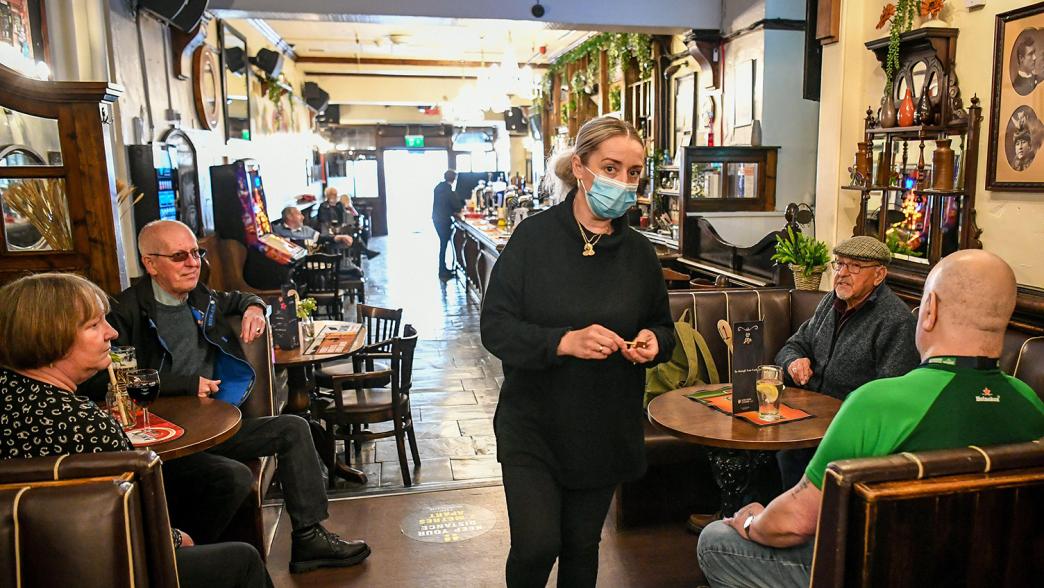Omicron wave means government should revive targeted economic support
Any economic support should learn the lessons of previous schemes to ensure better value for money.

A temporary reduction in social contacts provides a rationale for economic support regardless of whether the government formally imposes restrictions. But any support should learn the lessons of previous schemes to ensure better value for money, writes Thomas Pope
As the latest coronavirus wave surges across the country, some businesses are bound to be badly affected. Formal restrictions may need to be reimposed if the government’s ‘Plan B’ proves insufficient. But even if that does not happen, the impact of people reducing social contact voluntarily – and being strongly encouraged to do so by the government’s most senior medical adviser – will lead to a similar temporary fall in economic activity and affect hospitality businesses at what would usually be their busiest time of the year.
Previously during the pandemic, the government has supported jobs and protected businesses when demand has been low, most obviously through the furlough scheme. This support had the intended effect: despite huge falls in economic activity, unemployment remained low and most employees kept their jobs.
Most of these schemes have now closed, but the rationale at play earlier in the crisis applies again now, and the government should step in even if it sticks with its current approach of Plan B restrictions and encouraging people to limit contacts. But it should do so in a smarter and more targeted way, learning the lessons from the past 18 months to achieve better value for money.
Government support is needed if restrictions substantially limit businesses’ custom
Throughout the pandemic, the government’s approach to economic support has been consistent. Where laws in place to limit the spread of coronavirus stopped businesses from trading or limited their profitability, it has stepped in with grants and loans for businesses and furlough support to keep employees in their jobs.
Unlike in usual recessions, the businesses that have been badly affected are not simply those with bad business models and no long-term future. Instead, they are wide swathes of businesses in sectors that simply happen to be worst affected by temporary Covid restrictions. Government support during the pandemic has both alleviated the harm caused by unemployment and business failure in the short term and kept businesses intact for the recovery.
The latest wave may require the government to implement restrictions that go beyond Plan B. If the government still believes that its approach to economic support earlier in the pandemic was correct – and early evidence suggests that the employment recovery in the UK has been stronger than in some other countries – it should provide support again.
The government should provide support even if it does not formally reimpose restrictions
The rationale outlined above applies not only if the government forces businesses to close or operate at reduced capacity but also if official (albeit not legally binding) guidance has that effect. What is relevant is that businesses are affected – temporarily – by actions that people take to reduce the spread.
In the last few days, several government figures – including Chris Whitty at yesterday’s press conference – have urged people to reduce social contact and be cautious – going well beyond the official regulations. And this appears to be having a noticeable effect on social contact and economic activity. For example, this week restaurant bookings have been 20% down on their 2019 level having been above 2019 levels for most of November.[1]
Under these circumstances, it would be a mistake for the government to refuse to offer support.
Support should be targeted and learn the lessons from earlier schemes
However, the government should not simply resurrect the same schemes used earlier in the pandemic. These were schemes designed rapidly in March 2020, and we have learned much since then about how they operated. That evidence should allow the government to target the scheme better this time round.
By far the most expensive scheme was furlough, which cost £70 billion.[2] It has been hailed in all quarters as a great success, succeeding in keeping unemployment low. However, it could and should have been better targeted. When the scheme ended, over a million jobs were still being supported right across the economy, and yet the vast majority went back to working their pre-furlough hours once the scheme ended.[3] This is an odd pattern, and could point to fraudulent use of the scheme by some businesses. At the very least, it suggests that the scheme could have ended a month earlier – in August rather than September – and still had a similar positive effect on jobs and the economy.
The furlough scheme has a vital role to play if business demand falls again, but it needs to be better targeted at those sectors directly affected by reduced social contact, similar to the way business grants have been targeted throughout the pandemic. This will help ensure businesses use it as intended. We made this argument in a paper in September, and what happened when the original furlough scheme shut strengthens the case further.
The case for more temporary economic support for businesses affected by the latest Covid wave is strong whether or not the government formally reimposes restrictions. But the Treasury must learn the lessons of the past 18 months to ensure that more support is better targeted and provides better value for taxpayer money.
- www.opentable.com/state-of-industry
- www.gov.uk/government/statistics/coronavirus-job-retention-scheme-statistics-16-december-2021/coronavirus-job-retention-scheme-statistics-16-december…
- www.resolutionfoundation.org/publications/post-furlough-blues/
- Supporting document
- coronavirus-job-retention-scheme.pdf (PDF, 1.21 MB)
- Topic
- Coronavirus Public finances
- Keywords
- Economy
- Publisher
- Institute for Government